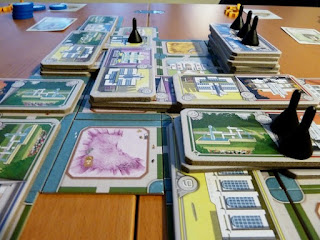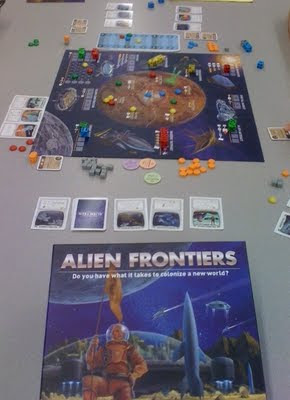I would like to thank my guest reviewer Chris C. for continuing to bring us wonderful reviews such as the following:
Sunrise City is a recent tile-laying game by Clever Mojo Games, who also made the excellent and very popular Alien Frontiers. Tile laying is a widely-used mechanic, appearing in games as diverse as Taluva and Eclipse. The giant of the genre is certainly Carcassonne, and Sunrise City draws on this lineage while adding some neat new ideas.
A game of Sunrise City is played over 3 rounds, each divided up into four phases. First, players draw zoning and building tiles and pick a unique role that will give them a special power until the next round. In the second phase, players place their zoning tiles on the table, extending the city outward. Then players bid on the right to build on the empty zones. Finally, in the building phase, players place their building tiles. Buildings can either go on zoning tiles that a player has won the right to build on in the bidding phase or on other buildings to create upper floors. They must always be placed on zones or other buildings that match their color (except for the purple “mixed use” zones and buildings). The color-matching requirement creates exciting tension as you hope the spots on which you can build will remain available.
The scoring mechanic is a particular novelty of Sunrise City. As players earn points, they move up a 10-place track with a star at the top. Every time a player gets past the star, they earn a star-shaped “benchmark token” and loop around to the bottom. But a player who lands exactly on the star earns TWO benchmark tokens. The player with the most benchmark tokens at the end of the game wins, so a large part of the game’s strategy comes from maneuvering to land exactly at the top of the track and “double” your scoring.
Points are scored every time a building is placed, but also in a variety of other ways. A player can earn points by placing a zoning tile next to another of the same type to create a “district”, by building next to the special “community” tiles, by building odd-numbered upper floors, or by a number of special powers on the role cards. Managing the various scoring methods to land exactly at 10 points is a fun challenge.
Another wonderful aspect of this game is its components. The building tiles are the thickest pieces of cardboard I’ve ever seen in a game, and give you the feel of building a city in three dimensions. The pieces for bidding are thick wooden poker chips and the game includes large black plastic pieces for keeping track of the odd-floor scoring bonus - they look really neat on the city. Everything is bright and colorful, though there is one problem in that the blue on the buildings doesn’t perfectly match the blue on the zoning tiles. Happily, the zoning and building tiles also have icons corresponding to the colors.
I do have one complaint about this game, which is the amount of luck. Depending on the tiles you are dealt, it simply may not be possible to get to exactly 10 points, potentially giving your opponents a major advantage. Luck can be a problem with any number of players. In the first round of one 3-player game, I drew two all-green building tiles, but there was only one green zone on the entire board. I ended up having to discard the tiles and miss this major point-scoring opportunity. In games with 4-players, there are more opportunities for scoring on any given turn, but it’s very hard to plan for landing on 10 points across multiple turns because your opponents will often cause you to score points during their turns. Since landing exactly at 10 points is so important, it would be nice to have more control over the scoring.
Despite the luck problem, I found this to be a very fun game. Looking for the best place to play your buildings on the city provides a neat puzzle every turn. And the game plays very quickly, often in less than 45 minutes with folks who have played before. In such a quick game with so many fun parts, the amount of luck is probably forgivable. It certainly feels more strategic than tile-laying
classics like Carcassonne, especially since you draw 4 zoning tiles and 4 building tiles at the beginning of each turn, allowing for a little more planning. And building a large city in three dimensions is very satisfying.
Overall, I think this is a nice game. It’s the best game I’ve played that uses tile laying as a central mechanic. If you like tile laying or are looking for a light-weight strategy game and don’t mind a bit of luck, you should definitely check it out.
7.5/10
If Sunrise City sounds interesting, you might also check out Architekton, Carcassonne, and Cityscape.
I would like to thank Clever Mojo Games for providing a review copy of Sunrise City.
Sunrise City is a recent tile-laying game by Clever Mojo Games, who also made the excellent and very popular Alien Frontiers. Tile laying is a widely-used mechanic, appearing in games as diverse as Taluva and Eclipse. The giant of the genre is certainly Carcassonne, and Sunrise City draws on this lineage while adding some neat new ideas.
A game of Sunrise City is played over 3 rounds, each divided up into four phases. First, players draw zoning and building tiles and pick a unique role that will give them a special power until the next round. In the second phase, players place their zoning tiles on the table, extending the city outward. Then players bid on the right to build on the empty zones. Finally, in the building phase, players place their building tiles. Buildings can either go on zoning tiles that a player has won the right to build on in the bidding phase or on other buildings to create upper floors. They must always be placed on zones or other buildings that match their color (except for the purple “mixed use” zones and buildings). The color-matching requirement creates exciting tension as you hope the spots on which you can build will remain available.
 |
| Double points for landing on 10 |
Points are scored every time a building is placed, but also in a variety of other ways. A player can earn points by placing a zoning tile next to another of the same type to create a “district”, by building next to the special “community” tiles, by building odd-numbered upper floors, or by a number of special powers on the role cards. Managing the various scoring methods to land exactly at 10 points is a fun challenge.
Another wonderful aspect of this game is its components. The building tiles are the thickest pieces of cardboard I’ve ever seen in a game, and give you the feel of building a city in three dimensions. The pieces for bidding are thick wooden poker chips and the game includes large black plastic pieces for keeping track of the odd-floor scoring bonus - they look really neat on the city. Everything is bright and colorful, though there is one problem in that the blue on the buildings doesn’t perfectly match the blue on the zoning tiles. Happily, the zoning and building tiles also have icons corresponding to the colors.
 |
| Building three dimensional cities |
Despite the luck problem, I found this to be a very fun game. Looking for the best place to play your buildings on the city provides a neat puzzle every turn. And the game plays very quickly, often in less than 45 minutes with folks who have played before. In such a quick game with so many fun parts, the amount of luck is probably forgivable. It certainly feels more strategic than tile-laying
classics like Carcassonne, especially since you draw 4 zoning tiles and 4 building tiles at the beginning of each turn, allowing for a little more planning. And building a large city in three dimensions is very satisfying.
Overall, I think this is a nice game. It’s the best game I’ve played that uses tile laying as a central mechanic. If you like tile laying or are looking for a light-weight strategy game and don’t mind a bit of luck, you should definitely check it out.
7.5/10
If Sunrise City sounds interesting, you might also check out Architekton, Carcassonne, and Cityscape.
I would like to thank Clever Mojo Games for providing a review copy of Sunrise City.


